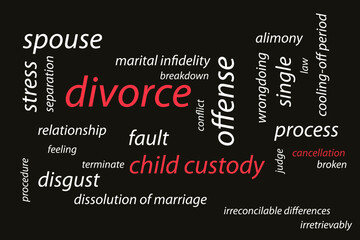746

DISSOLUTION OF MARRIAGE: PROBLEMS AND PROSPECTS TAKING INTO CONSIDERATION MARRIAGE ACT (CAP 127) PART 2
Written By:
Akwasi Boakye, LLB
Annulment of Marriages in Ghana
Annulment of marriage in Ghana is grounded in law, specifically the Matrimonial Causes Act, 1971 (Act 367) and the Marriages Act, 1884-1985, CAP 127.
A marriage celebrated under the Marriages Act may be considered valid, void or voidable in accordance with the statutory provision governing marriages. Thus, an annulment of marriage is the process by which a party to a statutory marriage (Marriages Act) seeks to completely obliterate the marriage on the basis that the marriage right from inception is void or voidable by arguing a statutory basis. It is imperative to note that a marriage is valid if it is contracted in consonance with the strict stipulations of the laws of the Republic of Ghana.[1]
Lord Greene, MR offers a fine distinction between Void and Voidable Marriages. In the case of De Reneville v. De Reneville (1948) 1 ALL ER 56-60, CA, Lord Greene, in the following words, described what the distinction is between Void and Voidable Marriages:
"A void marriage is one that will be regarded by every court in any case in which the existence of the marriage is in issue as never having taken place and can be so treated by both parties to it without the necessity of any decree annulling it: a voidable marriage is one that will be regarded by every court as valid subsisting marriage until a decree annulling it has been pronounced by a court of competent jurisdiction".[2]
The annulment of a void or voidable marriage, like divorce, changes the party's status by a judicial decree. Whatever the theoretical differences between them are, both are means of terminating a marriage that has broken down. Divorce, however, does not act retrospectively; the parties are still regarded as having been husband and wife up to the time when the decree was made absolute.
Where a party to a valid marriage wishes to terminate it, he has to file a divorce proceeding for the dissolution of the marriage. However, where a proceeding is initiated to bring a void or voidable marriage to an end, it ought to be one for annulment and not a dissolution of the marriage. Such a proceeding for the annulment of the marriage is called nullity proceedings.
The grounds for the annulment of void and voidable marriages are governed by the explicit stipulations of the enacted laws of the Republic.
These include:
Void Marriage
To speak of a void marriage is merely a compendious way of saying that, although the parties have been through a marriage ceremony, they have never acquired the status of husband and wife due to the presence of some impediment. If they have never been through any ceremony at all, their union cannot be termed a void marriage.
Grounds For Declaring Marriages Void
According to section 74 of the Marriages Act, 1884-1985 (CAP 127), the grounds for setting aside a marriage for it being void ab initio is as follows:
Where either of the parties, at the time of the celebration of the marriage, is lawfully married to another person, the subsequent marriage shall be declared null and void and of no effect. The marriages Act state unequivocally that, even where one of the parties is married under the applicable customary law to a person other than the person with whom the marriage is celebrated, the subsequent statutory marriage shall remain void ad initio.
Section 74 (1) (b) of the Marriages Act, 1884-1985, Cap 127 succinctly provides that a marriage is not valid: "where either of the parties, at the time of the celebration of the marriage is married under the applicable customary law to a person other than the person with whom the marriage is celebrated."
From the above reading of the law, it is worth understanding that parties to a previous customary marriage should jointly undertake a subsequent statutory marriage to avoid the subsequent statutory marriage being declared null and void.[3]
Prohibited Decree of Consanguinity and Affinity
Section 74 of the Marriages Act provides another viable ground for declaring marriage void ab initio. A marriage shall be liable to become void on the basis of consanguinity of affinity. Consanguinity is a form of a marriage contracted between persons related by blood. At the same time, an affinity is a form of a marriage contracted by individuals with whom one is related via marriage.
Formal Defects
A marriage becomes void for certain formal defects, among which includes the following:
Where both parties knowingly and wilfully acquiesce in its celebration in any place other than the office of a registrar of marriages or a licensed place of worship (except where authorized by Special License). Where the parties marry without the Registrar's Certificate of Notice or the Marriage Officer's Certificate of Notice or Special License. Where the marriage is solemnized by a person who is not a recognized minister of some religious denomination or body or a registrar of marriages. Where the parties celebrate the marriage under a false name or false names.
Voidable Marriage
A voidable marriage is considered valid until a party takes practicable steps to initiate proceedings in court to have it declared nullity. In essence, it is valid until declared otherwise.
Grounds For Declaring Marriages Voidable
Section 13(2) of Act 367 states that in addition to any other grounds on which a marriage is by law void or voidable, a marriage shall be voidable on the grounds that: the marriage has not been consummated owing to the wilful refusal of the respondent to consummate it; or at the time of the marriage, either party to the marriage was of unsound mind or subject to recurrent attacks of insanity; or the respondent was at the time of the marriage pregnant by some person other than the petitioner; or the respondent was at the time of the marriage suffering from an incurable venereal disease in a communicable form.[4]
Restriction In Respect of The Grounds in Sections 13 (2) (b), (c), (d) of the Matrimonial Causes Act, 1971. However, the court will not grant a decree of nullity in any of the cases falling under b, c and d unless a party can demonstrate any of the following:
Section 13(3) states that the court shall not grant a decree of nullity in a case falling within paragraph (b), (c) or (d) of subsection 2 unless it is satisfied that: the petitioner was at the time of the marriage ignorant of the facts making the marriage voidable, proceedings were instituted within one year from the date of the marriage, and marital intercourse with the consent of the petitioner has not taken place since the petitioner discovered the existence of the facts making the marriage voidable.
What happens if someone opposes the marriage?
If a person opposed to the marriage enters a caveat against a registrar's or marriage officer's certificate, the registrar or marriage officer will refer the matter to the High Court and a judge will assess the merit of the caveat. If the caveat has no merit, the judge will remove it and the marriage will go ahead. If the person filing the caveat is deemed to have done so in bad faith, they can be ordered to pay compensation to the couple.
Conclusion
Marriage is a creation of law. Therefore, a marriage is valid if it is in conformity with all legal requirements as established. To establish that marriage is either void or voidable, an initiating party must prove with certainty any of the grounds as listed above to succeed in a nullity proceeding.
It is crucial for a party to a marriage to consider the option of divorce. In particular, where he or she cannot establish a ground for nullity since there are several grounds for divorce under the Matrimonial Causes Act, 1971, including the ground of unreasonable behaviour.
